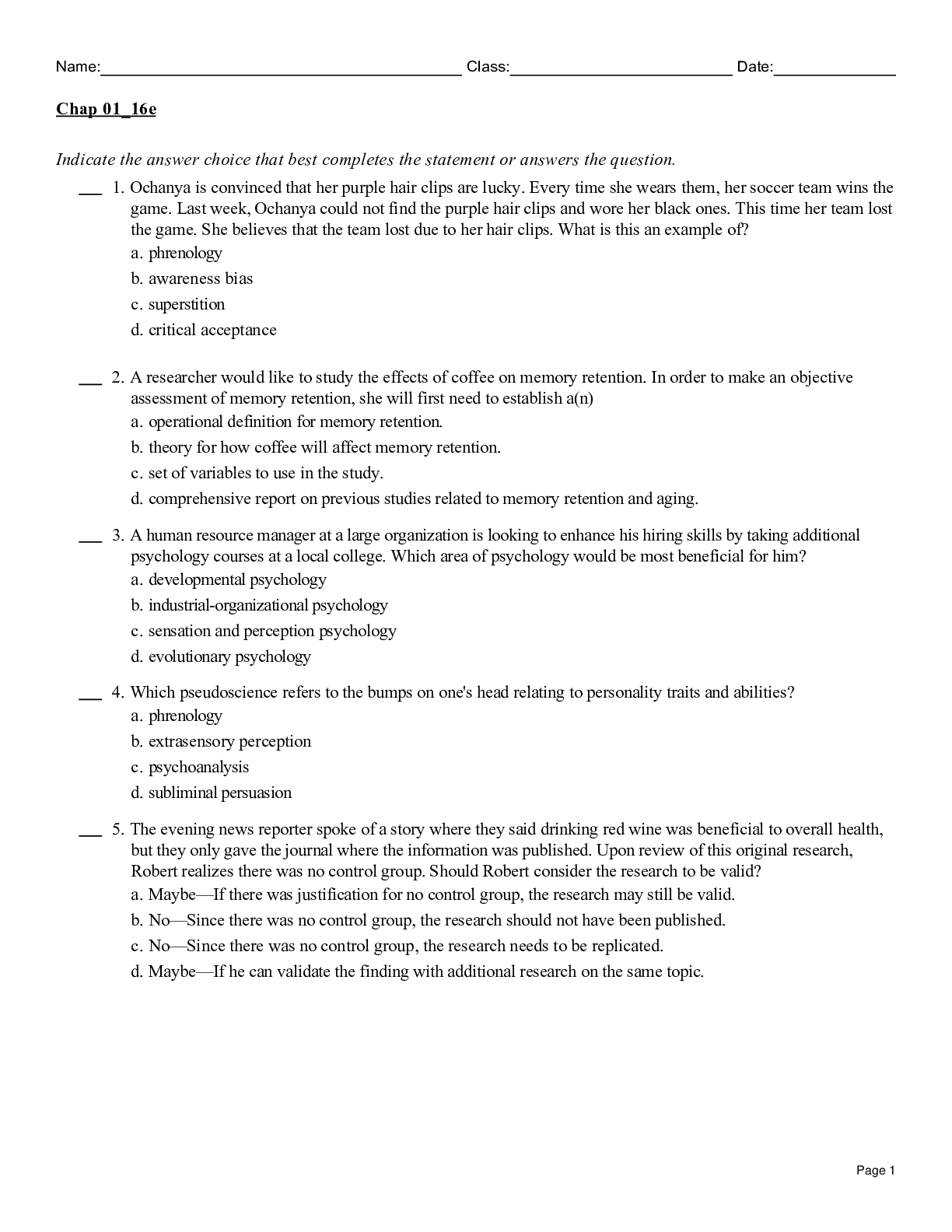Physiology > TEST BANKS > Seidel’s Guide to Physical Examination, 9th Edition by Jane Ball | TEST BANK (All)
Seidel’s Guide to Physical Examination, 9th Edition by Jane Ball | TEST BANK
Document Content and Description Below
MULTIPLE CHOICE • Which question would be considered a “leading question?” • “Please describe any associated symptoms with your headaches?” • “You don’t get headaches often, do yo ... u?” • “What activities affect the severity of your headaches?” • “What times of the day are your headaches the most severe?” • “What worries you most about your headache?” ANS: B This question would limit the information in the patient’s answer. The other choices allow the patient more discretion about the extent of an answer. TOP: Discipline: Behavioral Science MSC: Organ System: General • Which action would best promote accurate translations as well as confidentiality when the caregiver does not speak the patient’s language? • Ask a person unfamiliar with the patient to translate. • Have a friend of the patient translate. • Ask simple leading questions that the patient may understand. • Use a neighbor as translator. • Involve the family with the translation. ANS: A When you do not speak the patient’s language, family members or friends may pose a communication barrier and may have issues of confidentiality; a stranger as an interpreter is less biased. TOP: Discipline: Behavioral Science MSC: Organ System: General • Periods of silence during the interview can serve important purposes, such as: • allowing the clinician to catch up on documentation. • giving you a clue that you should speed up the interview. • providing time for reflection. • increasing the length of the visit. • promoting a calm environment. ANS: C Silence is a useful tool during interviews for the purposes of reflection, summoning of courage, and displaying compassion. It is usually a clue for you to go slower and not to push too hard. TOP: Discipline: Behavioral Science MSC: Organ System: General • Which technique is most likely to result in the patient’s understanding of questions? • Use phrases that are commonly used by other patients in the area. • Use the patient’s own terms if possible. • Use language that keeps the patient from being expansive in his or her answer. • Use proper medical and technical terminology. • Use the simplest language possible. ANS: B To ensure that your questions have been correctly understood, be clear, and explicit while using the patient’s idiom and level of understanding. TOP: Discipline: Behavioral Science MSC: Organ System: General • A patient becomes restless during the history and says, “I don’t have time for all of this conversation. I’ve got to get back to work.” Your most appropriate response would be to: • stop using open-ended questions and become more direct. • ask another open-ended question and insist on an answer. • ask questions about his anger and move closer to him. • acknowledge his anger and proceed with the history and examination. • ignore his displeasure and become more assertive about getting answers. ANS: D This is the only answer that resists the tendency for patient manipulation, pursues the information, and confronts the patient’s anger. TOP: Discipline: Behavioral Science MSC: Organ System: General • When questioning a patient regarding alcohol intake, she tells you that she is “only a social drinker.” Which initial response is appropriate? • “I’m glad that you are a responsible drinker.” • “Many people who are reN allyR alcI ohoG lic sB ay .tC heyMare social drinkers.” • “What amount and what kind of alcohol do you drink in a week?” [Show More]
Last updated: 1 year ago
Preview 10 out of 511 pages

Loading document previews ...
Buy this document to get the full access instantly
Instant Download Access after purchase
Buy NowInstant download
We Accept:

Reviews( 0 )
$16.00
Can't find what you want? Try our AI powered Search
Document information
Connected school, study & course
About the document
Uploaded On
Mar 25, 2021
Number of pages
511
Written in
All
Additional information
This document has been written for:
Uploaded
Mar 25, 2021
Downloads
0
Views
156






.png)

_removed.png)
















